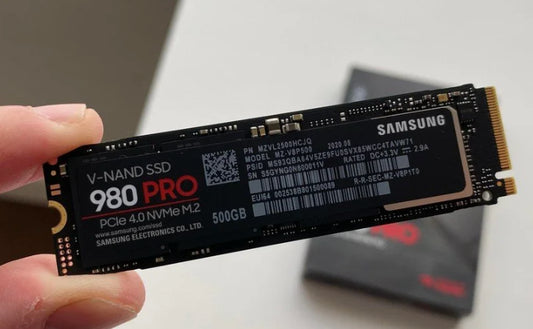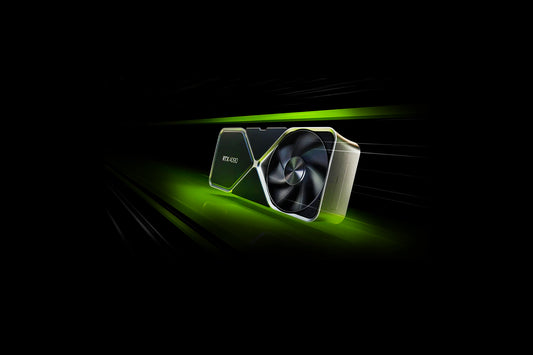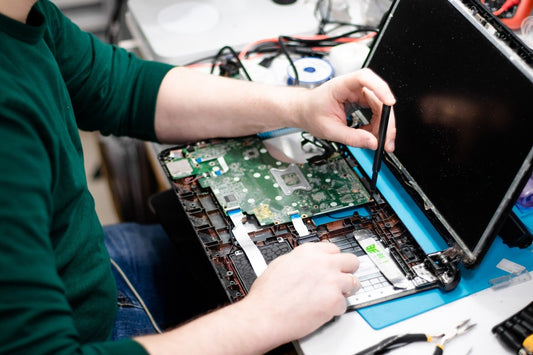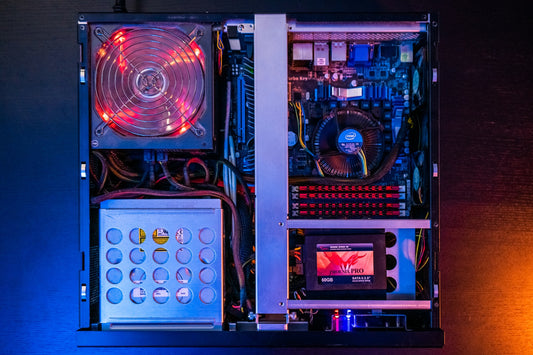🎮 NVIDIA RTX 50 Series – The Future of Gaming & AI 🚀
NVIDIA's GeForce RTX 50 Series, unveiled at CES 2025, is the next generation of gaming and AI-powered graphics. Built on the Blackwell architecture, this new series promises double the performance of the RTX 40 series, delivering cutting-edge AI, ray tracing, and power efficiency.
Whether you're a hardcore gamer, content creator, or AI developer, the RTX 50 Series offers unparalleled power, speed, and efficiency. Here’s everything you need to know! 👇
🔥 Key Features of the RTX 50 Series
🛠 Blackwell Architecture: Next-Level Performance
The Blackwell architecture is the foundation of the RTX 50 series, featuring significant advances over its predecessor, Ada Lovelace. This architecture is engineered for unparalleled efficiency and performance, offering:
- 4th-Gen Ray Tracing Cores: Delivers real-time lighting, shadows, and reflections with extreme detail.
- 5th-Gen Tensor Cores: Enhanced AI-driven upscaling and dynamic resolution for maximum FPS.
- 21,760 CUDA Cores (RTX 5090): With up to 21,760 CUDA cores in the RTX 5090, the series delivers unparalleled computational power for rendering, gaming, and creative tasks.

🧠 DLSS 4 – AI-Assisted Frame Generation
Deep Learning Super Sampling (DLSS) 4 represents the next evolution of NVIDIA's AI-powered performance enhancer. Unlike DLSS 3, which focused on frame generation, DLSS 4 employs Multi-Frame Generation:
- AI-Powered Frame Prediction: Boosts frame rates without sacrificing visual quality.
- 8X Performance Gains: Games like Cyberpunk 2077 and Starfield see up to 8x FPS increases.
- Broader Game Support: Works across more titles and creative applications.
💻 Model Comparison: RTX 5090 vs 5080 vs 5070 Ti vs 5070
Each model in the RTX 50 series is 2X better than its RTX 40 counterpart. Here’s a breakdown:

🤔 Should You Buy the RTX 50 Series Now?
One of the biggest questions is: Should you buy the RTX 50 series now or wait?
The answer depends on your priorities:
- Buy Now If: You want the latest cutting-edge performance, already have a high-wattage PSU, or need AI-powered features for work.
- Wait If: You want to see real-world benchmarks, prefer to wait for driver stability updates, or hope for a price drop later in 2025.
"Our founder is the kind of person who HAS to have the latest tech as soon as it drops. If you're the same, then the RTX 50 Series is a no-brainer! 🚀"
However, if you prefer to wait, we’ll be testing these GPUs in our custom builds and sharing performance benchmarks soon!
🔧 Build Your Ultimate PC – Best CPU Pairings for RTX 50 Series
🟢 Best CPU for RTX 5090
AMD
Any of the High end X3D range from AMD with its 3D V-Cache would give this card the extra power it so deserves. They boast large L3 Cache's reducing bottlenecks, have better power efficiency than High clocked Intel CPUs. These are our choices:
AMD Ryzen 7 9800X3D processor 4.7 GHz 96 MB L3 Box
AMD Ryzen 9 7900X3D processor 4.4 GHz 128 MB L2 & L3 Box
Intel
Or these Intel core i9 will provide the super data transfer rates, and high boost clock with the 6.0Ghz for the i9-14000K and higher with a clocked i9-14900KS. The i9-14900K features 24 cores (8 P-cores + 16 E-cores), 32 threads.
Intel Core i9-14900K processor 36 MB Smart Cache Box
Intel Core i9-14900KS processor 36 MB Smart Cache Box
🔥 CPU Pairing with RTX 5090
| Feature | Intel i9-14900K | AMD Ryzen 7800X3D / 7950X3D |
|---|---|---|
| Gaming Performance | 🔹 Faster in CPU-bound, high-FPS games (1080p, 1440p). | ✅ Best in most games due to 3D V-Cache, lower CPU bottleneck at high FPS. |
| Power Efficiency | 🔻 Very high power draw (300W+ with overclocking). | ✅ More power-efficient (50-80W gaming). |
| Heat Output | 🔻 Runs hot. Requires high-end cooling. | ✅ Runs cooler, even with air cooling. |
| Multitasking (Streaming, Editing) | ✅ Better for heavy workloads due to more cores/threads. | 🔹 Decent but falls behind in non-gaming tasks. |
| Future-Proofing | 🔹 New socket required for Intel 15th Gen (Arrow Lake). | ✅ AM5 platform will support future CPUs. |
🟢 Best CPU for RTX 5080
AMD
AMD CPUs, particularly the Ryzen 7 7800X3D and Ryzen 9 9900X, excel in gaming efficiency due to 3D V-Cache (for the 7800X3D) and a solid balance of core count and clock speeds (for the 9900X). They offer great power efficiency, ensuring lower temperatures and longer-lasting components. However, multithreaded workloads (like rendering or AI processing) may not be as fast as Intel’s higher-core CPUs.
AMD Ryzen 7 7800X3D processor 4.2 GHz 96 MB L3 Box
AMD Ryzen 9 9900X processor 4.4 GHz 76 MB L2 & L3 Box
Intel
Intel CPUs, like the Core Ultra 9 285K and Core i7-14700K, are built for raw performance and multitasking. The 285K features AI-accelerated processing and high core/thread counts, making it great for productivity, streaming, and multitasking. The i7-14700K is a more budget-friendly option with high single-threaded performance, making it a great mid-range choice for gaming. However, Intel CPUs tend to consume more power and generate more heat, requiring better cooling solutions.
Intel Core Ultra 9 285K processor 36 MB Smart Cache Box
Intel Core i7-14700K processor 33 MB Smart Cache Box
🔥 CPU Pairing with RTX 5080
| Feature | AMD Ryzen 7 7800X3D | AMD Ryzen 9 9900X | Intel Ultra 9 285K | Intel Core i7-14700K |
|---|---|---|---|---|
| Gaming Performance | ✅ Best in most games due to 3D V-Cache | 🔹 Great, but slightly behind 7800X3D | 🔻 May be slower in gaming than AMD | ✅ High single-core speed benefits gaming |
| Power Efficiency | ✅ Extremely efficient (~50-80W gaming) | 🔹 Moderate power usage (~120W) | 🔻 High power draw (~250W) | 🔻 Runs hot (~200W) |
| Multitasking (Streaming, Editing, AI) | 🔹 Decent, but fewer cores | ✅ Strong for productivity (12 cores, 24 threads) | ✅ Best for AI tasks, rendering & multitasking | 🔹 Good, but fewer cores for extreme tasks |
| Overclocking Potential | 🔻 Limited due to 3D V-Cache | ✅ Unlocked, good for overclocking | ✅ Can be overclocked, but requires strong cooling | ✅ Decent overclocking headroom |
| Heat Output | ✅ Runs cool, even on air cooling | 🔹 Slightly warm, but manageable | 🔻 Runs hot, needs a high-end cooler | 🔻 Runs warm, requires good cooling |
| Future-Proofing | ✅ AM5 platform supports future CPUs | ✅ AM5 supports next-gen Ryzen processors | 🔹 Requires LGA 1851 socket | 🔹 Likely the last generation on LGA 1700 |
🟢 Best CPU for RTX 5070 Ti
AMD
Here again the AMD 7800X3D and the 9700X will dominate for Gaming, especially the 7800X3D as it benefits from the 3D V Cache, reducing latency and enhancing FPS in CPU-limited games, making it a top choice for competitive gaming. The 9700X provides a more balanced gaming and productivity experience with higher core counts. However, AMD CPUs can have limited overclocking headroom due to architectural constraints.
AMD Ryzen 9 7900X processor 4.7 GHz 64 MB L3 Box
AMD Ryzen 7 9700X processor 3.8 GHz 40 MB L2 & L3 Box
Intel
The Ultra 7 265K and Core i9-12900K, excel in multitasking, productivity, and raw processing power. The Ultra 7 265K features AI acceleration and high core/thread counts, making it a great option for streaming, content creation, and heavy workloads. The i9-12900K is an older yet powerful hybrid-core processor, offering great single-core performance, though it runs hot and requires strong cooling solutions.
Intel Core Ultra 7 265K processor 30 MB Smart Cache Box
Intel Core i9-12900K processor 30 MB Smart Cache Box
🔥 CPU Pairing with RTX 5070 Ti
| Feature | AMD Ryzen 7 7800X3D | AMD Ryzen 9 9700X | Intel Ultra 7 265K | Intel Core i9-12900K |
|---|---|---|---|---|
| Gaming Performance | ✅ Best for gaming due to 3D V-Cache | 🔹 Great, but slightly behind 7800X3D | 🔻 May be slower in gaming than AMD | ✅ High single-core speed benefits gaming |
| Power Efficiency | ✅ Extremely efficient (~50-80W) | 🔹 Moderate power usage (~100W) | 🔻 Higher power draw (~220W) | 🔻 Runs hot (~250W) |
| Multitasking (Streaming, Editing, AI) | 🔹 Decent, but limited by 8 cores | ✅ Strong for productivity (12 cores, 24 threads) | ✅ Best for AI tasks, streaming & multitasking | ✅ Great for productivity |
| Overclocking Potential | 🔻 Limited (3D V-Cache restricts tuning) | ✅ Unlocked, good for overclocking | ✅ Can be overclocked, but needs strong cooling | ✅ Good overclocking headroom |
| Heat Output | ✅ Runs cool, even on air cooling | 🔹 Slightly warmer but manageable | 🔻 Runs hot, requires better cooling | 🔻 Runs extremely hot, needs high-end cooling |
| Future-Proofing | ✅ AM5 platform supports future CPUs | ✅ AM5 supports next-gen Ryzen processors | 🔹 Requires LGA 1851 socket | 🔻 Older platform (LGA 1700), limited upgrades |
🟢 Best CPU for RTX 5070
The RTX 5070 is expected to be a powerful mid-range GPU, and choosing the right CPU will ensure you get the most out of its performance.
AMD
AMD’s Ryzen 9 9700X and Ryzen 7 7700X offer great gaming and productivity balance. The 9700X, with 12 cores and 24 threads, is better suited for multitasking, content creation, and future-proofing. Meanwhile, the 7700X is a more affordable gaming-focused option, featuring strong single-core performance at a lower price point.
AMD Ryzen 7 9700X processor 3.8 GHz 40 MB L2 & L3 Box
AMD Ryzen 7 7700X processor 4.5 GHz 32 MB L3 Box
Intel
Intel’s Ultra 5 245KF and Core i7-14700F provide strong competition. The Ultra 5 245KF, with a new AI-accelerated architecture, is a solid mid-range option for gaming and productivity. The i7-14700F, with its higher core count and no integrated graphics, is great for gaming and work, but runs hot and consumes more power than AMD alternatives.
Intel Core Ultra 5 245KF processor 24 MB Smart Cache Box
Intel Core i7-14700F processor 33 MB Smart Cache Box
🔥 CPU Pairing with RTX 5070
| Feature | AMD Ryzen 9 9700X | AMD Ryzen 7 7700X | Intel Ultra 5 245KF | Intel Core i7-14700F |
|---|---|---|---|---|
| Gaming Performance | ✅ Great for gaming | ✅ Best for gaming in this group | 🔹 Decent, but slightly behind AMD | ✅ High single-core speed benefits gaming |
| Power Efficiency | 🔹 Moderate (~100W) | ✅ Lower consumption (~80W) | 🔻 Higher draw (~200W) | 🔻 Needs strong cooling (~220W) |
| Multitasking (Streaming, Editing, AI) | ✅ Best for productivity (12 cores, 24 threads) | 🔹 Decent, but not ideal for heavy workloads | ✅ AI acceleration benefits multitasking | ✅ Strong for work & gaming |
| Overclocking Potential | ✅ Unlocked, good for overclocking | ✅ Great for overclocking | ✅ Unlocked, but requires strong cooling | 🔻 Locked, no overclocking support |
| Heat Output | 🔹 Slightly warm, but manageable | ✅ Runs cool, good for air cooling | 🔻 Runs hot, requires better cooling | 🔻 Needs strong cooling due to high temps |
| Future-Proofing | ✅ AM5 platform supports future CPUs | ✅ AM5 is upgrade-friendly | 🔹 Requires LGA 1851 socket | 🔹 Likely last-gen for LGA 1700 |
Considerations:
It's important to note that the increased performance comes with higher power consumption. For instance, the RTX 5090 has a power draw of up to 575 watts, necessitating at least a 1,000-watt power supply. Additionally, the compact dual-slot design of the RTX 5090 makes it suitable for small form factor PCs, but adequate cooling solutions should be ensured.
Compatibility:
The RTX 50 Series Cards have all been designed to work on PCIe 4.0 or 5.0, however of course for the best performance we recommend PCIe 5.0. As long as you have a motherboard with PCIe 4.0 or 5.0 you will be able to use one of these incredible Graphics Cards.
Pairing with the right CPU for a 50 Series card is crucial to really get the best performance out of the GPU. Here are our recommendations:
📢 Watch NVIDIA’s RTX 50 Keynote
🚀 **Have questions? Chat with us or visit our store for expert recommendations!**








